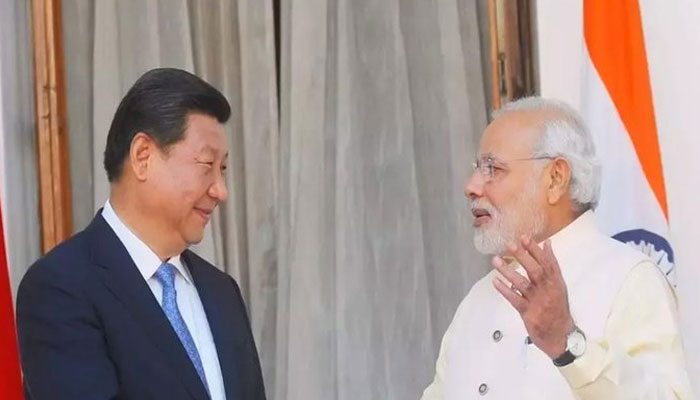Xi Jinping meets Modi: India, China agree to launch ‘new era’ of ties
MAMALLAPURAM: Indian Prime Minister Narendra Modi told visiting Chinese President Xi Jinping on Saturday that relations between their countries have attained stability and momentum in the past year, and that it should enable them to manage their differences and avoid disputes.
Modi said his summit with Chinese leader would launch a "new era" between the neighbours. He said both countries agreed to be sensitive to each other’s concerns as they held delegation-level talks, international media reported. Modi and Xi were meeting at a time of tensions over Beijing’s support for Pakistan in opposing New Delhi’s downgrading of Indian Occupied Kashmir’s semi-autonomy and continuing restrictions in the disputed region. Indian Foreign Secretary Vijay Gokhale told reporters that “this issue was not raised and discussed,” but that Xi apprised Modi of Prime Minister Imran Khan’s visit to Beijing earlier in the week. “India-China relations are not predicated to a single issue,” Gokhale said, adding that the latest developments in Kashmir were an “internal matter” of India.
Without going into details, Xi said in his opening remarks at the delegation-level talks that he had taken part in candid and in-depth discussions with Modi on various issues since his arrival Friday. Gokhale said the two countries decided to set up a group at the finance ministers’ level to discuss trade and investment issues, especially India facing a whopping $63 billion trade deficit with China.
According to India’s Commerce Ministry, India’s exports to China amounted to $13.33 billion in the 2018 financial year, compared with imports of $76.38 billion. Xi and Modi met over dinner for more than two hours on Friday after the Indian prime minister took the Chinese president around an ancient temple and some other monuments that are part of Unesco’s world heritage sites in Mamallapuram. Besides emphasising the expansion of trade and investment, Modi and Xi resolved to work together in facing the challenges of radicalisation and terrorism, Gokhale said. There was an acknowledgement that both India and China were “very complex and very diverse countries,” and that both will work together so that radicalisation and terrorism, which are common enemies, does not affect their multicultural, multi-ethnic and multi-religious societies, Gokhale said. He did not give details.
Xi had arrived in India two days after hosting Prime Minister Khan in Beijing. A meeting between Xi and Modi in Wuhan, China, in April 2018 was preceded by tensions caused by a 10-week standoff between their countries’ armed forces on the Bhutan border. China claims some 90,000 square kilometers (35,000 square miles) of territory in India’s northeast, while India says China occupies 38,000 square kilometres (15,000 square miles) of its territory on the Aksai Chin Plateau in the western Himalayas. Officials have met at least 20 times to discuss the competing border claims without making significant progress. India and China fought a border war in 1962.
India also is concerned about China’s moves to build strategic and economic ties with its neighbours Sri Lanka, Nepal, Bangladesh and the Maldives. Xi was scheduled to visit Nepal after India.
-
 Social Media Addiction ‘like Smoking’: Mumsnet Calls For Under-16s Ban With Cigarette-style Warnings
Social Media Addiction ‘like Smoking’: Mumsnet Calls For Under-16s Ban With Cigarette-style Warnings -
 Andrew Mountbatten, Virginia Giuffre's Photos Attached To Buckingham Palace Gates
Andrew Mountbatten, Virginia Giuffre's Photos Attached To Buckingham Palace Gates -
 Everything We Know About Bruce Willis Frontotemporal Dementia
Everything We Know About Bruce Willis Frontotemporal Dementia -
 Singapore's Grab Plans AI-driven Expansion And New Services To Boost Profit By 2028
Singapore's Grab Plans AI-driven Expansion And New Services To Boost Profit By 2028 -
 Adele Reveals How She 'snapped Out Of' Sever Postpartum Depression
Adele Reveals How She 'snapped Out Of' Sever Postpartum Depression -
 ‘Chinamaxxing’ Explained: Inside Viral Gen Z Trend Taking Over TikTok And Instagram
‘Chinamaxxing’ Explained: Inside Viral Gen Z Trend Taking Over TikTok And Instagram -
 Fears Erupt About Sarah Ferguson Pulling A ‘Harry’ While Sitting On A King’s Ransom: ‘Her Leverage Still Stands’
Fears Erupt About Sarah Ferguson Pulling A ‘Harry’ While Sitting On A King’s Ransom: ‘Her Leverage Still Stands’ -
 Lisa Rinna Slams Andy Cohen For His Below The Belt Move: 'So Shady'
Lisa Rinna Slams Andy Cohen For His Below The Belt Move: 'So Shady' -
 Stunning New Photos Of The Milky Way Shed Light On How Stars Are Formed
Stunning New Photos Of The Milky Way Shed Light On How Stars Are Formed -
 Prince Harry, Meghan Face Fresh Calls To Lose Royal Titles Over ‘pseudo-royal’ Visit
Prince Harry, Meghan Face Fresh Calls To Lose Royal Titles Over ‘pseudo-royal’ Visit -
 Gordon Ramsay On His Basal Cell Carcinoma Diagnosis
Gordon Ramsay On His Basal Cell Carcinoma Diagnosis -
 Fukushima Decommissioning: Japan Deploys Snake-like Robot To Remove Nuclear Debris
Fukushima Decommissioning: Japan Deploys Snake-like Robot To Remove Nuclear Debris -
 Brenda Song Turns Macaulay Culkin's 'Home Alone' Into 'terrible' Lesson: 'Children Have To Be A Little Scared'
Brenda Song Turns Macaulay Culkin's 'Home Alone' Into 'terrible' Lesson: 'Children Have To Be A Little Scared' -
 MrBeast Vows To Book Only Starlink-equipped Flights As Global Airline Adoption Surges
MrBeast Vows To Book Only Starlink-equipped Flights As Global Airline Adoption Surges -
 Kim Jong Un Says North Korea Ready To ‘get Along’ With US But Sets Key Condition
Kim Jong Un Says North Korea Ready To ‘get Along’ With US But Sets Key Condition -
 Andrew Fears What Comes Next As Jeffrey Epstein Scandal Deepens
Andrew Fears What Comes Next As Jeffrey Epstein Scandal Deepens




